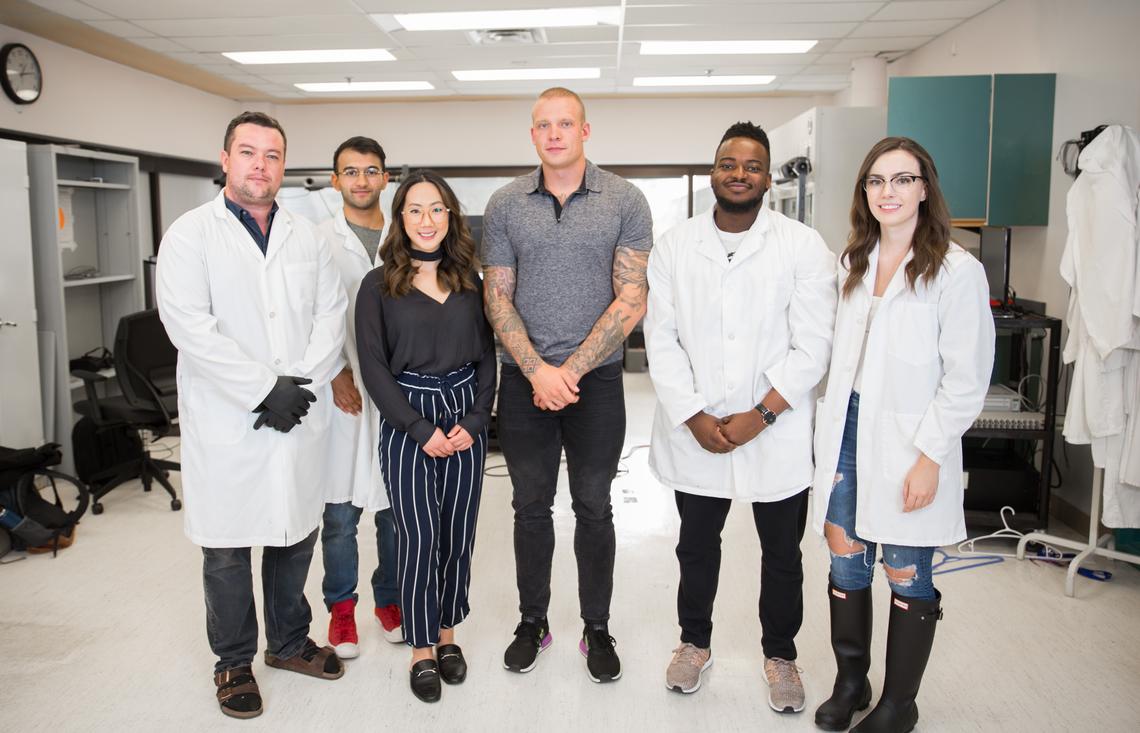Oct. 15, 2020
Kinesiology researcher creates new way to assess and track neurological function

Testing someone for nerve damage is done manually by a clinician who determines what a patient can detect on their skin, most often using a specialized set of monofilaments or a tuning fork. It can be a long and uncomfortable process for the patient and the clinician. But using wearable technologies, Dr. Ryan Peters, PhD, in the Faculty of Kinesiology and member of the Hotchkiss Brain Institute at the Cumming School of Medicine, is developing new ways for performing neurological testing anytime, anywhere, and with greater accuracy.
Peters is a co-founder and chief science officer of Vibratus Inc., which is bringing these new neurological wearable technologies to market. “You can think of Vibratus as your wearable neurologist,” says Peters. He is pictured above, right, with members of his team.

Ryan Peters.
Adrian Shellard
Peters is creating a suite of devices and a software application, or app, to remotely monitor sensory and motor function of the foot sole, hand and other parts of the body. Vibratus technology uses vibration-emitting wearable devices, such as smartphones and watches, to measure a patient’s neural responses. This biometric data can be tracked and exchanged between the patient and their health-care provider at chosen intervals, enabling the world’s first ‘virtual neurology clinic.’ The COVID-19 pandemic provides an ideal proving ground for such technologies, when in-person access to the neurologist can be more restrictive.
“Patients with nerve damage have increased risk of injuries and falls, and yet months can go by before they can visit a neurologist to have their condition re-assessed. With this app, both the doctor and patient will quickly know if personalized treatment strategies are working or if they need to be adjusted,” says Peters.
Peters says the technology is useful for nerve disorders such as peripheral neuropathy (nerve damage caused by conditions such as Type 2 diabetes or chemotherapy), peripheral nerve or spinal cord injuries, cerebral palsy, Parkinson’s disease and stroke. The clinical tests that Vibratus is looking to improve upon are part of the standard neurological exam, making them useful for a broad range of neurological disorders.
Though still in the testing phase now, Peters plans to launch the app within the next year and has filed U.S. provisional patents for these technologies. “It would be great to see our devices in the hands of everyone who does neurological testing. We have the potential to improve outcomes for people with neurological disorders while saving time and money for the health-care industry.”
A hand up from partner
Vibratus will be the first startup business to come out of the Faculty of Kinesiology’s new specialization in wearable technology, referred to as We-TRAC. Dr. Reed Ferber, PhD, who leads the We-TRAC program, says Peters has been a fantastic addition to the collaborative group.
“He has shown success in obtaining grants, working with companies, and now as the first startup company to come out of We-TRAC,” says Ferber. Peters says Ferber has been a tremendous mentor to him, and that it was Ferber who suggested he apply for the grants that are now supporting this endeavour.
As well as receiving a $101,500 grant from the National Sciences and Engineering Research Council of Canada, or NSERC, Peters received a $200,000 Life Science Fellowship from Innovate Calgary. These grants are for research and development funding, and the creation, entrepreneurship and talent development for emerging life science-based companies.
“Innovate Calgary has supported our device prototyping activities and helped guide the business development for Vibratus which has been invaluable to us,” says Peters. “I appreciate the incredible support I’m receiving from everyone.”
Peters also collaborates closely with Drs. Tyler Cluff, Art Kuo and Nicole Culos-Reed in the Faculty of Kinesiology, along with his incoming students and the Vibratus team, including co-founders Raied Aburashed, who is the chief executive office and holds a Bachelor of Science degree from the Schulich School of Engineering at UCalgary, and Dr. Osman Darici, PhD, who is the chief technology officer and a postdoctoral scholar in the Faculty of Kinesiology at UCalgary.
For more information about the program, contact Dr. Ryan Peters, PhD.
We-TRAC is developing the next generation of wearable tech experts and focusing on using wearable technology to revolutionize sport performance, health care and health research.
The University of Calgary’s Faculty of Kinesiology is the No. 1 ranked sport science school in North America and No. 7 globally, according to ShanghaiRanking.
Led by the Hotchkiss Brain Institute, Brain and Mental Health is one of six research strategies guiding the University of Calgary toward its Eyes High goals. The strategy provides a unifying direction for brain and mental health research at the university.
The University of Calgary’s multidisciplinary Engineering Solutions for Health: Biomedical Engineering research strategy drives solutions to our most pressing health challenges in disease and injury prevention, diagnosis, and treatments. Our biomedical engineering researchers make a significant impact in our communities by extending lives, improving quality of life, promoting independence, and continuously improving the health system.
(Photos were taken prior to COVID-19)

Ryan Peters lab group in the Faculty of Kinesiology at the University of Calgary



